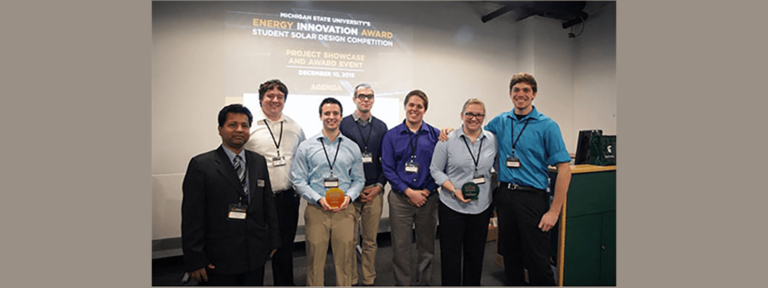
“The two Kettering teams were the only two teams among the top 10 finalists that were not from MSU.”
Two Kettering University student teams set themselves apart as the next generation of sustainability leaders after a statewide innovation competition named them first place winners.
The eight students from Kettering's Energy and Environment Systems Design capstone design class took top places at the Michigan State University Energy Innovation Award and Student Solar Design Competition Dec. 10, 2015.
The first team won first place for outstanding design, real-world working product and excellent ideas and innovation. They won the ability to work with companies to create an improved prototype of their product.
The second team won the Inovateus Solar PEACE Award for their environmentally friendly real-world working product, design and innovation. The award won the recognition of Inovateus Solar out of South Bend, Indiana, and may be able to work with them going forward.
“We are inviting the young engineers to help protect our environment as an objective of our course at Kettering,” said Dr. Susanta Das, Mechanical Engineering faculty member, who taught the Energy and Environmental Systems Design capstone design (Mech521) class and served as academic advisor for the teams.

The winning group with the project name of Flint’s Bright Future created a sustainable solution to street lighting and added a bit of creativity with the option for multiple colored lights.
Powered by solar panels, the street light can light up the area around it, becoming brighter when a motion sensor detects someone coming near.
The team included students Andrew Paul ‘15, Kevin Parzuchowski ‘15, David Shaffer ‘15 and Jonathan Kline ‘15.
Kline said it was an honor to be awarded first place at the competition.
“When I held my hand up I was shaking I was so excited,” he said. “Our product was feasible and we had the prototype to prove it.”
Growing up in Grand Haven, Kline remembers seeing lights along the pier during the holidays and that got him thinking about being able to change their color. That same concept could be used on a college campus or city street. The color could be changed to school colors or blink red in an emergency.
“It removes the dependence on fossil fuel power, raises awareness of events and initiates school spirit,” Kline said.
The competition, hosted by Michigan State University, was aimed at engaging the next generation of sustainable leaders in key energy issues by challenging college students across the state to envision innovative solutions for a clean energy future.
The competition tasked interdisciplinary student teams with designing cost-effective, energy-efficient and design-centric solar installations for a campus landscape. Projects earned points for creativity, innovation, design, application, interdisciplinary collaboration and entrepreneurship. Each project was evaluated for creativity, design, application and entrepreneurship, challenging participants to push the boundaries of clean energy innovation.
The two Kettering teams were the only two teams among the top 10 finalists that were not from MSU, and they also happened to be the only two teams with functioning prototypes, Das said.
The second Kettering team, which won the Peace prize, created a sustainable way to charge small electronic devices.
The prototype was created to lay over a window sill with the solar panel positioned outside and the charging box inside, available with two USB ports and one three-prong outlet. It also included a battery to allow charging at night.
The team included students Erika Beursken ‘15, Rebekah Gowman ‘15, John Britt ‘15 and Dylan Orcutt ‘15.
Britt said he was pleasantly surprised to hear his team received the Peace award. Peace served as an acronym of what the team and the project stood for: Passion, engagement, ambition, creativity and esprit de corps.
“I personally was very excited,” Britt said. “We chose our project in order to make an impact.”
There’s a really large population of people using and charging mobile devices, which is why it was an important focus group.
“If we take these off the grid it will have a very positive impact on the environment,” Britt said.